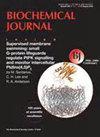Identification of aSinorhizobium meliloti YbgC-like thioesterase that contributes to the production of the infochemical 2-tridecanone.
IF 4.3
3区 生物学
Q2 BIOCHEMISTRY & MOLECULAR BIOLOGY
引用次数: 0
Abstract
Sinorhizobium meliloti is a soil bacterium that can establish beneficial symbiosis with legume plants. The fadD gene encodes a long-chain fatty acyl-coenzyme A (CoA) synthetase. Inactivation of FadD in S. meliloti leads to a pleiotropic phenotype, including the overproduction of several volatile methylketones (MKs). One of them, 2-tridecanone (2-TDC), was found to act as an infochemical that affects important bacterial traits and hampers plant-bacteria interactions. Knowledge about bacterial genes involved in MK production is limited. In wild tomato species, MK synthesis requires intermediates of fatty acid biosynthesis and the activity of the methylketone synthase 2 (MKS2), a thioesterase belonging to the hot dog-fold family. In this study, we have identified SMc03960, a conserved hypothetical protein with homology to bacterial YbgC-like thioesterases, as an ortholog of MKS2 in S. meliloti. Heterologous expression of smc03960 in Escherichia coli results in the formation of several MKs, including 2-TDC, and causes the accumulation of free fatty acids. Purified His-SMc03960 showed thioesterase activity for different acyl groups linked either to acyl carrier protein (ACP) or to CoA with preference for C14-long substrates. Moreover, formation of 2-TDC in vitro was achieved by using His-SMc03960 and 3-oxo-myristoyl-ACP. Although deletion of smc03960 in the wild type or in the fadD mutant does not significantly alter the amount of MKs released by S. meliloti, overexpression of the gene results in increased production of 2-TDC in these two strains. Overall, our data demonstrate that SMc03960 is an acyl-ACP/acyl-CoA thioesterase with broad substrate specificity that contributes to 2-TDC formation.促进信息化学物质2-三烯酮生成的亚硝酸根菌ybgc样硫酯酶的鉴定。
meliloti Sinorhizobium meliloti是一种能与豆科植物建立有益共生关系的土壤细菌。fadD基因编码一种长链脂肪酰基辅酶a (CoA)合成酶。在S. meliloti中,FadD的失活导致多效表型,包括几种挥发性甲基酮(mk)的过量产生。其中,2-三萜类化合物(2-TDC)被发现作为一种信息化学物质,影响重要的细菌特性并阻碍植物与细菌的相互作用。有关细菌基因参与MK生产的知识是有限的。在野生番茄物种中,MK的合成需要脂肪酸生物合成的中间体和甲基酮合成酶2 (MKS2)的活性,MKS2是一种属于热狗折叠家族的硫酯酶。在这项研究中,我们已经鉴定出SMc03960,一个与细菌ybgc样硫酯酶同源的保守假设蛋白,作为S. meliloti中MKS2的同源物。smc03960在大肠杆菌中的异源表达导致包括2-TDC在内的几种mk的形成,并导致游离脂肪酸的积累。纯化后的His-SMc03960对与酰基载体蛋白(ACP)或辅酶a连接的不同酰基表现出硫酯酶活性,对c14 -长的底物具有优先性。此外,用His-SMc03960和3-氧肉豆肉酰基acp在体外形成2-TDC。虽然smc03960在野生型或fadD突变体中的缺失并没有显著改变S. meliloti释放的mk量,但该基因的过表达导致这两个菌株中2-TDC的产生增加。总的来说,我们的数据表明SMc03960是一种酰基acp /酰基coa硫酯酶,具有广泛的底物特异性,有助于2-TDC的形成。
本文章由计算机程序翻译,如有差异,请以英文原文为准。
求助全文
约1分钟内获得全文
求助全文
来源期刊

Biochemical Journal
生物-生化与分子生物学
CiteScore
8.00
自引率
0.00%
发文量
255
审稿时长
1 months
期刊介绍:
Exploring the molecular mechanisms that underpin key biological processes, the Biochemical Journal is a leading bioscience journal publishing high-impact scientific research papers and reviews on the latest advances and new mechanistic concepts in the fields of biochemistry, cellular biosciences and molecular biology.
The Journal and its Editorial Board are committed to publishing work that provides a significant advance to current understanding or mechanistic insights; studies that go beyond observational work using in vitro and/or in vivo approaches are welcomed.
Painless publishing:
All papers undergo a rigorous peer review process; however, the Editorial Board is committed to ensuring that, if revisions are recommended, extra experiments not necessary to the paper will not be asked for.
Areas covered in the journal include:
Cell biology
Chemical biology
Energy processes
Gene expression and regulation
Mechanisms of disease
Metabolism
Molecular structure and function
Plant biology
Signalling
 求助内容:
求助内容: 应助结果提醒方式:
应助结果提醒方式:


